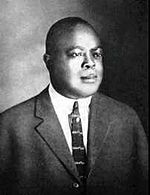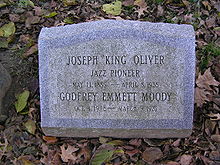- Joe "King" Oliver
-
Joseph Nathan "King" Oliver 
Joseph Oliver, about 1915Background information Birth name Joseph Nathan Oliver [1] Also known as King Oliver Born May 11, 1885 Origin Aben, Louisiana, USA Died April 10, 1938 (aged 52) Genres Jazz
DixielandOccupations bandleader Instruments cornet Associated acts Louis Armstrong
Johnny DoddsJoe "King" Oliver (May 11, 1885 – April 10, 1938) was a jazz cornet player and bandleader. He was particularly noted for his playing style, pioneering the use of mutes. Also a notable composer, he wrote many tunes still played regularly, including "Dipper Mouth Blues", "Sweet Like This", "Canal Street Blues", and "Doctor Jazz". He was the mentor and teacher of Louis Armstrong. His influence was such that Armstrong claimed, "if it had not been for Joe Oliver, jazz would not be what it is today".[2]
Contents
Biography
Life
Joseph Oliver was born in Aben, Louisiana, near Donaldsonville in Ascension Parish, and moved to New Orleans in his youth. Oliver played cornet in the New Orleans brass bands and dance bands and also in the city's red-light district, Storyville. The band he co-led with trombonist Kid Ory was considered New Orleans' hottest and best in the 1910s. Oliver achieved great popularity in New Orleans across economic and racial lines, and was in demand for playing jobs from rough working class black dance halls to white society debutante parties.
According to an interview at the Tulane's Hogan Jazz Archive with Oliver's widow Stella Oliver, in 1919 a fight broke out at a dance where Oliver was playing, and the police arrested him, his band, and the fighters. This made Oliver decide to leave the Jim Crow South.
By 1922, after travels in California, Oliver was the jazz king in Chicago, with King Oliver and his Creole Jazz Band performing at the Royal Gardens (later renamed the Lincoln Gardens). Virtually all the members of this band went on to notable solo careers. Personnel included Oliver on cornet, his protégé Louis Armstrong on second cornet, Baby Dodds on drums, Johnny Dodds on clarinet, Lil Hardin (later Armstrong's wife), on piano, Honoré Dutrey on trombone, and William Manuel Johnson on bass and banjo. Recordings made by this group in 1923 demonstrated the serious artistry of the New Orleans style of collective improvisation or Dixieland music to a wider audience.
In the mid and late 1920s Oliver's band transformed into a hybrid of the old New Orleans style jazz band and the nationally popular larger dance band, and in 1926 was christened "King Oliver and His Dixie Syncopators".[3] Although he suffered from gum disease which started to diminish his playing abilities, Oliver remained a popular band leader through the decade.
Oliver's business acumen was less than his musical ability. A succession of managers stole money from him. He demanded more money for his band than the Savoy Ballroom was willing to pay, and lost the gig. In similar fashion, he lost the chance for an engagement at New York City's famous Cotton Club when he held out for more money; young Duke Ellington took the job and subsequently catapulted to fame.[4] (Apparently, Oliver's records for Brunswick, Vocalion and Victor sold about the same as the other prominent Black bands, based on the fact that copies of his records do turn up fairly frequently. In the later twenties, Oliver employed his nephew Dave Nelson, as well as Henry "Red" Allen, as lead trumpet.)
Death
The Great Depression brought hardship to Oliver. He lost his life savings to a collapsed bank in Chicago, and he struggled to keep his band together through a series of hand-to-mouth gigs until the group broke up and Oliver was stranded in Savannah, Georgia, where he worked as a janitor at Wimberly's Recreation Hall (526-528 West Broad Street). Oliver died in poverty at a rooming house (508 Montgomery Street), on April 10, 1938.[5] He was buried in Woodlawn Cemetery[6] in the Bronx, NY, where he would be joined by other jazz giants such as Coleman Hawkins, Lionel Hampton, W. C. Handy, Milt Jackson, Max Roach, and Miles Davis, among others, all of whom owe a great debt to "Papa Joe".
Work and influence
As a player, Oliver took great interest in altering his horn's sound. He pioneered the use of mutes, including the plumber's plunger, derby hat, and bottles and cups. His recording "WaWaWa" with the Dixie Syncopators can be credited with giving the name wah-wah to such techniques.
Oliver was also a talented composer, and wrote many tunes that are still regularly played, including "Dipper Mouth Blues", "Sweet Like This", "Canal Street Blues", and "Doctor Jazz".
Oliver performed mostly on cornet. He credited Buddy Bolden as an early influence, and in turn was a major influence on numerous younger musicians in New Orleans and Chicago, including Tommy Ladnier, Paul Mares, Muggsy Spanier, Louis Panico, Johnny Wiggs, and Louis Armstrong.
As a mentor to Armstrong, Oliver gave young Louis his first cornet in New Orleans and later summoned him to Chicago to record and play with his band. Louis remembered Oliver as "Papa Joe" and considered him his idol and inspiration. In his autobiography, "Satchmo - My Life in New Orleans", Armstrong writes:
It was my ambition to play as he did. I still think that if it had not been for Joe Oliver, Jazz would not be what it is today. He was a creator in his own right.
Honors
Oliver was inducted as a charter member of the Gennett Records Walk of Fame in Richmond, Indiana in 2007.
Selected discography
- Complete Victors, Vols. 1, 2 (Frog UK, 2007)
- Great Original Performances, (1923–1930) (Louisiana Red Hot, 2-CDs, 1998)
- Dippermouth Blues, (ASV Living Era, 1997)
See also
- "Snag it"
References
- ^ http://www.doctorjazz.co.uk/draftcards2.htm
- ^ "Satchmo - My Life in New Orleans"
- ^ Southern, Eileen (1997). The Music of Black Americans, p. 379. W.W. Norton & Company. ISBN 0393038432.
- ^ Barnhart, Scott (2005). The World of Jazz Trumpet, p. 21. Hal Leonard Corporation. ISBN 0634095277.
- ^ There is disagreement on the date of Oliver's death. His grave marker says April 8 and this date appears in John Chilton's Who's Who in Jazz, as well as in his biography at AllMusic. However, in his biography at Portraits from Jelly Roll's New Orleans, by Peter Hanley, the author quotes an April 10 date from Oliver's Chatham County, Georgia, death certificate #8483.
- ^ Joe "King" Oliver at Find a Grave
External links
- Joe "King" Oliver by Peter Gerler (www.jazz.com)
- Joseph Oliver at RedHotJazz.com
- King Oliver
- King Oliver's WWI Draft Registration Card and Essay
Categories:- 1885 births
- 1938 deaths
- African American musicians
- American jazz bandleaders
- American jazz cornetists
- American jazz songwriters
- Dixieland jazz musicians
- Gennett recording artists
- Okeh Records artists
- Vocalion Records artists
- Jazz cornetists
- Jazz musicians from New Orleans, Louisiana
- People from New Orleans, Louisiana
- Deaths from myocardial infarction
Wikimedia Foundation. 2010.

